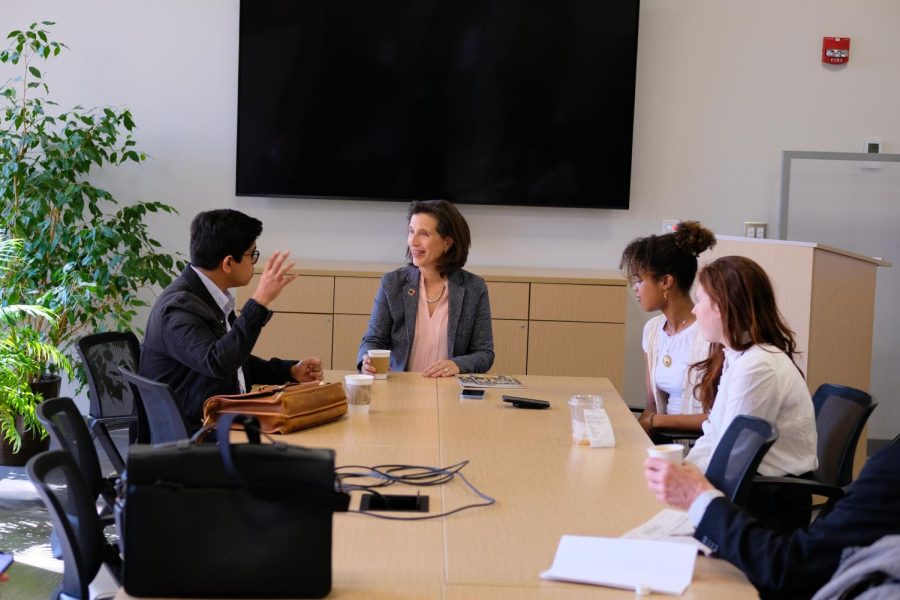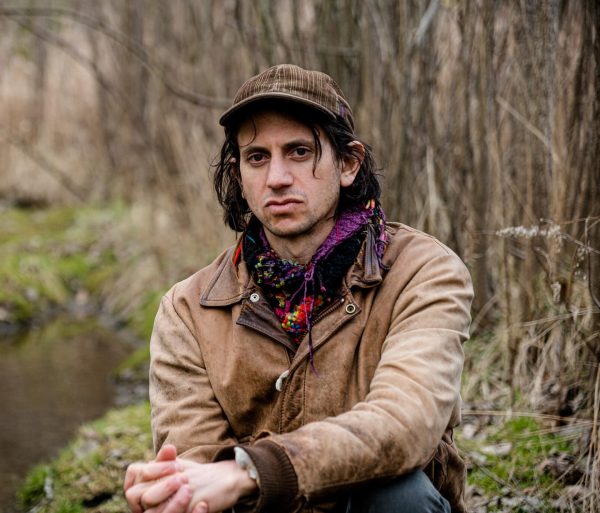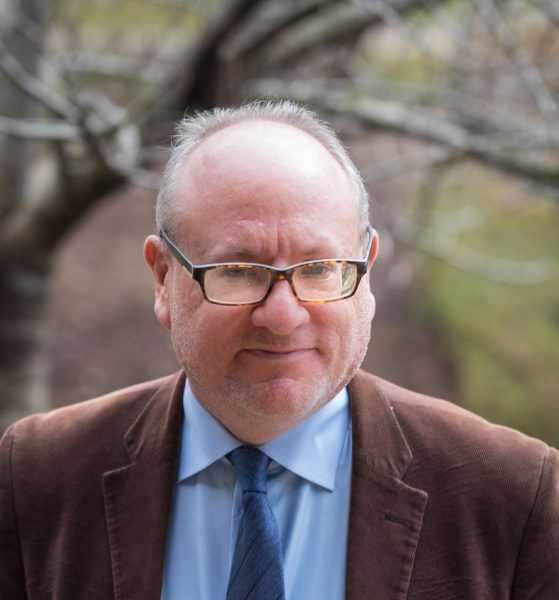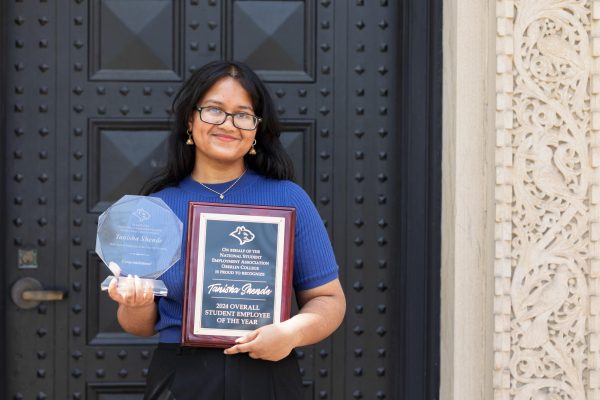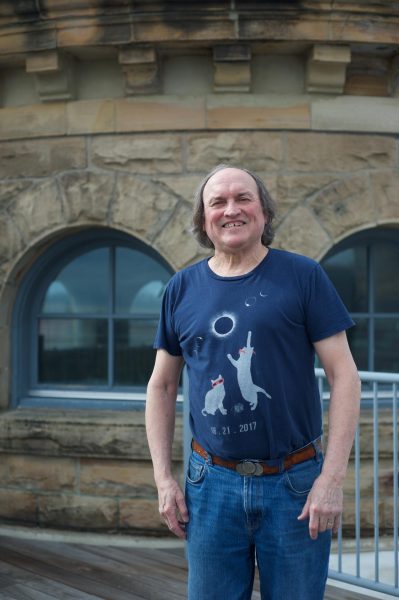Melissa Fleming: United Nations Under-Secretary-General, OC ’86
Photo Courtesy of John Seyfried
Fleming spoke with editors of the Review.
United Nations Under-Secretary-General Melissa Fleming, OC ʼ86, has served as the head of the U.N. Department of Global Communications since 2019. She earned her B.A. in German studies from Oberlin College, followed by an M.S. in Broadcast Journalism from Boston University in 1989. She has since worked as a radio journalist in Berlin, a spokesperson for the International Atomic Energy Agency, and a spokesperson for the U.N. High Commissioner for Refugees. She also served as a senior advisor on the Transition Team for U.N. Secretary General António Guterres between October 2016 and February 2017. Fleming returned to Oberlin for the first time since graduating to interact with students and give a lecture titled “From Oberlin to the World: My Journey with the United Nations.”
This interview has been edited for length and clarity.
You graduated from Oberlin College in 1986. How are you feeling being back and interacting with students?
Well, itʼs been 37 years. As I was preparing my lecture today, I struggled to remember all of the steps on my journey to where I am now. But my Oberlin experience I really feel was fundamental to the trajectory of my life. I remember when I arrived here, and I felt really lonely because I didnʼt know anyone for the first time in my life. Iʼm sure itʼs the usual first-year experience, but I was just wondering what I was doing here. A couple of days later, as I was walking alone to one of my first classes, the director of admissions at the time stopped me and said, “Hi Melissa, how are you?” And I was like, “He remembered my name.” Then he started to ask me about Marblehead, MA, where I come from, and he knew the details of my life. Then I remembered, this is why I chose Oberlin — because I was not going to be a number here — and that feeling was going to have a huge impact on how I communicate later on. I communicate the statistics of human suffering. I can communicate about the state of our world. Thereʼs a saying, “Statistics are human beings with the tears dried off,” and what I needed to do was to infuse those statistics with stories — stories of history, politics, and more. And those would be the stories I would tell going forward.
Focusing on global communication, how do you think that different forms of media can be used to promote journalism and communication?
I think journalism is so critically important in a democratic and stable society. Unfortunately, it is under threat in our digital age. Social media platforms have pulled advertising dollars away from traditional media, and this has resulted in a collapse of local media. And yet we are in an age where those same platforms are not promoting news, but conspiracy theories, disinformation, and junk science. We need to move back and drive support for traditional media, because what it does is provide citizens with factual, trusted information and holds people and power accountable. Without that pillar, we have an information ecosystem that is totally out of balance.
How do you manage the vast network of U.N. communications around the world?
This campaign uses our resources in local languages for distribution, and also local media partners, social media influencers, et cetera. So thatʼs one approach to communications built into our strategy, which is based on what I call the three Ws of communications. These are “what,” “why care,” and “what now.” And the W we really focus on is “what,” and we do this really well because we distribute the facts. We have reported on the latest climate science, the statistics of how many refugees are fleeing around the world, sustainable development goals, annual reports, and more. So we have a rich resource for almost anything youʼd want to know about whatʼs happening in the world. But the question is, if you want to communicate effectively, why do people care? Who is my target audience and why should they care about this? And if they should care about it, itʼs because you think that you need to bring them along. How am I going to tell the story in such a way that itʼs going to move them, itʼs going to make them feel and make them want to act? And the next question is, what now? What are you going to ask them to do? It is either a call to action to the reader, or the U.N. has a plan, or this has been solved somewhere else, so we can do it here.
In 2017 you released your book, A Hope More Powerful Than the Sea: One Refugeeʼs Incredible Story of Love, Loss, and Survival, which tells the story of Doaa Al Zamel, a Syrian girl whose life was upended in 2011. Could you talk about her story and how you discovered it?
Going back to the statistics and when I was communicating about refugees every single year, the numbers were growing, and they werenʼt growing by a hundred — they were growing by the tens of thousands. And the Syrian refugee crisis was a really dramatic time, with people fleeing and crossing the Mediterranean Sea. People taking these desperate journeys know that they could lose their lives. I realized we have to tell individual stories. One day I read a story in the Agence France- Presse about this young teenage girl whoʼd survived one of the worst shipwrecks: 500 people had died. When she was rescued, she had two little babies, and she had been on the water for four days and four nights. One of the little girls pulled through, and both of them survived and resettled to Sweden. So her story, every single chapter of her story, told the chapter of the entire Syrian refugee experience — the peace and the beauty of Syria before the war and then the horrors of the war and the refugee experience. What drives people to put their lives in the hands of smugglers to cross the Mediterranean Sea? The incredible resilience of the human spirit allows them to survive.
Has your work with refugees changed your perspective on the world?
I think one of the things that working with refugees changed for me was valuing the security I have and how we take ourselves for granted at home. We all try to say, “We want to get out of here.” But the thing that people value so much is a sense of belonging. I just started questioning the fundamental needs of human beings and how privileged we are not to be living in a war zone or having to flee suddenly. We have the ability to be able to make choices. You think about Maslowʼs pyramid of human needs. I started really thinking about that when I thought about refugees, because most of what we were able to do for refugees was satisfy the survival part. But what I saw in all the refugees that I met is that they all wanted self-actualization, and if it wasnʼt for them, it was for their children. The story that I told that I think exemplifies this is a young boy I met in a refugee settlement in Lebanon. I always asked refugees, “What did you take when you fled from your home? What was the one thing that you took that you couldnʼt leave behind?” And he went into his tent and came back with this silk-covered piece of paper. He lifted off the silk and he held up this piece of paper, and it was his high school diploma. He said, “I took my high school diploma because my life depended on it. Without education, I am nothing.”


